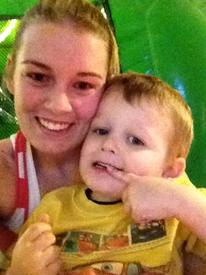How will this cardio mask affect my muscles?

hik4ru123
Posts: 7 Member
I bought this guy,
http://trainingmask.com/products/TRAINING-MASK-2.0.html
and I was wondering how the reduction in oxygen would affect my muscles during working out or a run.
I ask because I don't know, so thank you for your reply!
http://trainingmask.com/products/TRAINING-MASK-2.0.html
and I was wondering how the reduction in oxygen would affect my muscles during working out or a run.
I ask because I don't know, so thank you for your reply!
0
Replies
-
Why did you buy this? This looks like junk science to me, not to mention dangerous. Deprive yourself of oxygen while doing cardio! Yeah! That's not a recipe for f***ing brain damage.0
-
Why did you buy this? This looks like junk science to me, not to mention dangerous. Deprive yourself of oxygen while doing cardio! Yeah! That's not a recipe for f***ing brain damage.
well, it does work with building your cardio. My friend has improved his mile time greatly from it. Thank you for not answering my question.0 -
Could you clarify your question? You're asking how it affects your muscles, in what way though? It's a training tool, I know a lot of MMA guys use it for conditioning. It's supposed to simulate high-altitude training so your conditioning should improve nicely. I could see it being used by runners. It's not really gonna affect your muscles other than making you tired faster I would say. Less oxygen, you'll be out of breath in no time until your lungs adapt.
It's a cool concept, I don't really see anyone using it other than the most elite of athletes. I have no idea what level you're at though.0 -
Could you clarify your question? You're asking how it affects your muscles, in what way though? It's a training tool, I know a lot of MMA guys use it for conditioning. It's supposed to simulate high-altitude training so your conditioning should improve nicely. I could see it being used by runners. It's not really gonna affect your muscles other than making you tired faster I would say. Less oxygen, you'll be out of breath in no time until your lungs adapt.
It's a cool concept, I don't really see anyone using it other than the most elite of athletes. I have no idea what level you're at though.
I was just wondering if, say, I went for a 5 mile run. (say I could even do that with the mask, lol) and my muscles being engaged (quad, etc) are getting adapted to a lesser amount of oxygen during the run, then after the run, would they be getting "over-oxygenated"? Sorry if this doesn't make clear sense. and I'm training for the marines, and I have a few months before I ship so I got some time to get in the best shape I can.0 -
I bought this guy,
http://trainingmask.com/products/TRAINING-MASK-2.0.html
and I was wondering how the reduction in oxygen would affect my muscles during working out or a run.
I ask because I don't know, so thank you for your reply!
Essentially it will change what is an aerobic workout (in the presence of oxygen) to more of an anaerobic workout which will interrupt ATP production. As a result your muscle will convert glucose into lactic acid to produce the energy necessary to fuel your workout instead. This will probably mean you won't be able to exercise for as long.
The one thing I would be wary of is how it allows CO2 to leave your system.
You could always just do HIIT instead...0 -
I do not think the average person is going to benefit much from altitude training. The conventional thinking is that training at altitude increases blood cells and that should increase aerobic level, but it doesn't quite work that way. The effects of training are very specific to the conditions under which training occurs. A significant decrease in oxygen saturation will lead to a significant decrease in performance. So, in essence, you are decreasing the quality of your training. (And it's questionable whether such brief exposures to "altitude" would have any benefit anyway).
I experienced this myself about 20 years ago. I spent 3 weeks in the Rocky Mountains hiking all day, and running in the mornings at about 9,000 feet. As soon as I returned home, I ran one of my favorite courses, a somewhat hilly 5 mile loop that I had run right before I left. During the run I felt like Superman--the air felt like superfuel, my legs felt so strong the hills were like speedbumps, and I actually felt like my legs could not turn over fast enough to match the strength of my cardio system. I looked at my watch at the end, expecting an incredible new PB for that course and saw----2 minutes slower than I ran it 3 weeks before.
Most athletes today who do altitude training follow the mantra: "Train low, live high". If there are any benefits to be gained from altitude, they come from extended exposure to the condition, while training low to maintain the quality of the workouts.
It may be a moot point, since it does not appear that this mask simulates altitude training at all. It does not alter the O2 saturation in the air--it just restricts air flow and makes ventilation more difficult.
Increased ventilation can be of some benefit, but only modestly, and it's nothing you couldn't achieve by doing HIIT.0 -
I bought this guy,
http://trainingmask.com/products/TRAINING-MASK-2.0.html
and I was wondering how the reduction in oxygen would affect my muscles during working out or a run.
I ask because I don't know, so thank you for your reply!
Essentially it will change what is an aerobic workout (in the presence of oxygen) to more of an anaerobic workout which will interrupt ATP production. As a result your muscle will convert glucose into lactic acid to produce the energy necessary to fuel your workout instead. This will probably mean you won't be able to exercise for as long.
The one thing I would be wary of is how it allows CO2 to leave your system.
You could always just do HIIT instead...
Thank you! You have got me onto a lead for further research.0 -
I bought this guy,
http://trainingmask.com/products/TRAINING-MASK-2.0.html
and I was wondering how the reduction in oxygen would affect my muscles during working out or a run.
I ask because I don't know, so thank you for your reply!
Essentially it will change what is an aerobic workout (in the presence of oxygen) to more of an anaerobic workout which will interrupt ATP production. As a result your muscle will convert glucose into lactic acid to produce the energy necessary to fuel your workout instead. This will probably mean you won't be able to exercise for as long.
The one thing I would be wary of is how it allows CO2 to leave your system.
You could always just do HIIT instead...
i was going to say that.why not just incorporate HIIT sprints into your training?0 -
It shouldn't really affect your muscles to much... It would almost be re-training them. I know in the Marines, you get 2 weeks for acclimatization when you transfer to a new unit especially a unit that has a complete different environment then your previous. I do not know if you would be going to MCRD or Parris Island but I do not think it will hurt to use it every now then. But I do not really think it is necessary either.
Good Luck with the Marines0
This discussion has been closed.
Categories
- All Categories
- 1.4M Health, Wellness and Goals
- 398.2K Introduce Yourself
- 44.7K Getting Started
- 261K Health and Weight Loss
- 176.4K Food and Nutrition
- 47.7K Recipes
- 233K Fitness and Exercise
- 462 Sleep, Mindfulness and Overall Wellness
- 6.5K Goal: Maintaining Weight
- 8.7K Goal: Gaining Weight and Body Building
- 153.5K Motivation and Support
- 8.4K Challenges
- 1.4K Debate Club
- 96.5K Chit-Chat
- 2.6K Fun and Games
- 4.8K MyFitnessPal Information
- 12 News and Announcements
- 21 MyFitnessPal Academy
- 1.5K Feature Suggestions and Ideas
- 3.2K MyFitnessPal Tech Support Questions





